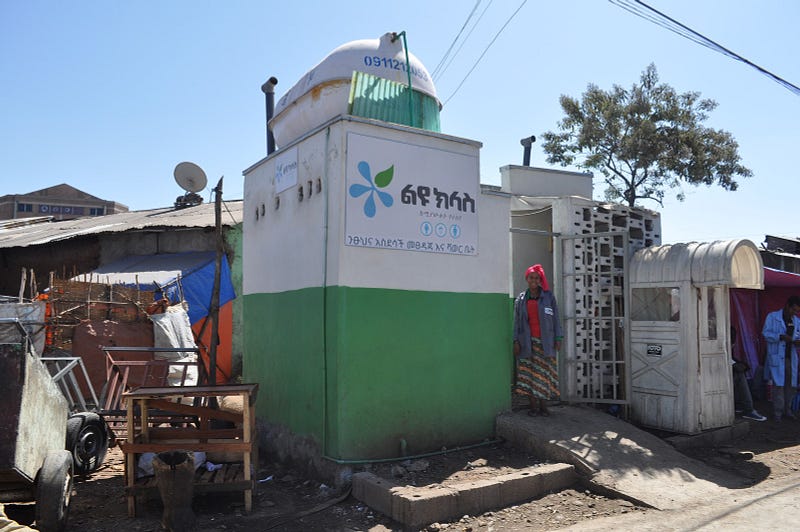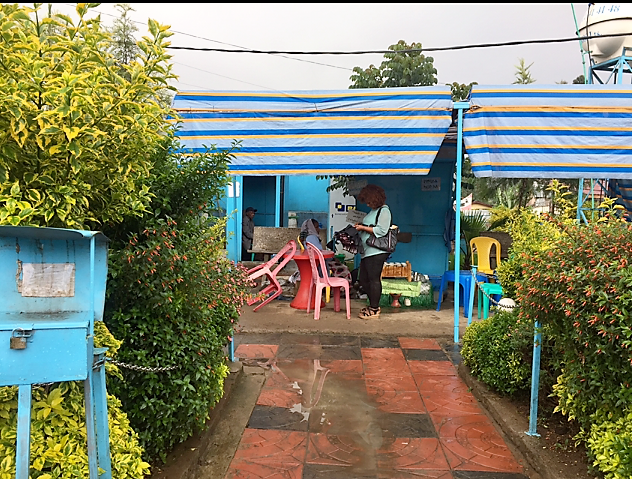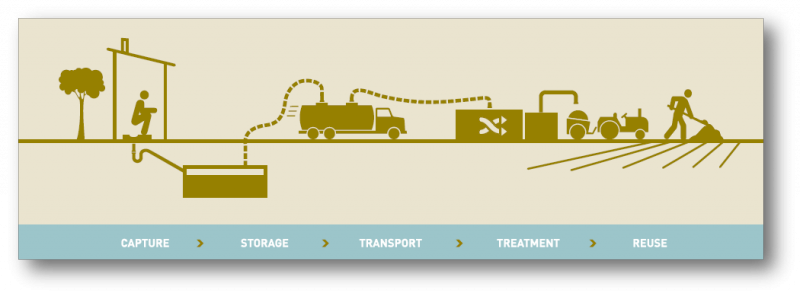Fitsum Gelaye
August 16, 2017
There is no readily available and coherent information on the different actors working in the sanitation in Ethiopia. This is why I have spent the past month doing the exhausting work necessary to understand the sanitation ecosystem in Addis Ababa and trace what organizations, in addition to the Addis Ababa Water and Sewerage Authority (AAWSA), are doing to ease the chronic problem the city has with inadequate service provision. I have gone from interview to interview to map out who the organizations are and what they are working on.
From my research, I have found that the NGOs that work in the field- which thus far have all been international organizations- have been forging a path to move sanitation from a type of basic service that is solely provided by the government to a profitable business that can create employment for many while decreasing the health and hygiene challenges that the city faces.
The biggest proponent of this move is the World Bank, which under its new Ethiopian Sanitation Marketing and Business Development Initiative Programhas dedicated around USD 40 million to expanding the public toilets of Addis Ababa. The program, which is scheduled to start in September of this year, will use its budget to provide loans of up-to USD 25,000 each to small, local co-op enterprises to construct public toilet facilities. The loan, a portion of which is to be distributed by the government and the rest by NGOs working locally in the WASH sector, is to be paid back in 38 years with an eight-year grace period with no interest.
The Bank’s plan goes beyond providing support for the physical construction of the toilets, by providing a six-module lesson on businesses administration that is available in multiple languages. Co-ops can take the course in order to learn how to efficiently run the toilets as a profitable business. Following the completion of this module, co-ops are allowed to enter an auction where they can win the funds to build a public toilet facility in multiple locations all over the city. The plan also involves creating a value chain for other business that will provide the different components that go into constructing and maintaining the public toilet facilities.

In addition to the World Bank, there are organizations such as Population Services International (PSI), that are also venturing into the sanitation business. In fact, PSI already has a pilot project called LiyuClass Toilets in four locations in one of Addis’ most densely populated Sub cities- Addis Ketema. LiyuClass, which loosely translates to ‘special class’, aims to change the infamous reputation that public toilets have in Addis and provide first class services to urban dwellers.
Each LiyuClass toilet facility, whose labor and material costs a total of USD 5,000, rest on 20 square meters and has two “gender-designated toilets”, a shower facility and an outdoors sink for washing hands. LiyuClass charges 2 birr (about 8 USD cents) to use the toilets, 1 birr (about 4 USD cents) for the urinals and 10 birr (about 45 USD cents) for showers. PSI plans on partially franchising the toilet designs after improving the design further and selling it to co-ops for about USD 1,300$ and a passive annual fee. They will monitor the maintenance and functionality of the toilets to ensure that the co-ops are running the business effectively.

Last but not least, AAWSA itself has also joined the “toilets for profit” bandwagon and has been constructing public toilet facilities and auctioning it out to groups of differently-abled people that have organized under the city’s kebeles- which are the Addis’s smallest administrative units. I was able to visit one of the facilities in a peri-urban neighborhood of Addis informally called Koshe. I initially walked past this Public Toilet and Rest Stop facility, mistaking it for a small public garden, with a quaint coffee and tea café. I was later able to learn that AAWSA has a specific design for these toilets that includes a small garden in the forefront with carefully selected flowers.
These AAWSA toilets share LiyuClass’ hope to change the reputation of the city’s toilets. The manager of the facility informed me that it costs just 1 birr (half the cost of using LiyuClass) to use one of the six toilets available (two of which are handicap accessible), and 50 cents for using the urinals. The facility has about 200 visitors a day and also supplements its revenue by selling refreshments and also operating a small all-purpose kiosk. The manager told me with pride that “For some people, even being able to have clean water to wash their hands with is a blessing”. Yet he said that despite the much needed service that they are providing, the facility can barely make ends meet. This is because this specific co-op is made up of 22 members, which in addition to the isolation of the neighborhood it is located in and the limited number of visitors, means there isn’t enough revenue to be shared adequately cover a member’s living expenses.
Despite the much needed involvement that this business oriented approach to tackling the sanitation crisis of Addis Ababa brings, it too has its own issues.
In Addis Ketema, a lease for 1 sq. meter of land can cost up to USD 10,500. When the designs of toilet and shower facilities are dependent on using septic tanks that need a significant amount of land to store wastewater, the price of leasing land significantly hikes up costs. The high price of land is the biggest challenge that their pilot project is facing. This problem is also shared by aforementioned public toilet facilities provided by AAWSA.
Even in parts of the city where land is relatively cheap, the dependence on septic tanks still creates problems for business owners. From my interview with the manager of the Koshe Public Toilet, I was able to learn that their septic tank had to be pumped every 10 days. Luckily, the co-ops that run the government provided facilities were able to negotiate a whooping 90% discount for the pumping services. Despite this, every ten days, they lose business because the unbearable smell of the full tank and the pumping process stops people from wanting to use the facilities.
Yet my biggest concern with these toilet facilities is the high possibility that they will exclude residents of some of the poorest neighborhoods of the city. The cost of 1 or 2 birr hold different meanings for residents with differencing economic statuses. To some it is just pocket change. To others however, 2 birr can buy 100 liters of clean water from a public fountain that can sustain a family for a couple of days. In addition, the fact that most households have more than five individuals means the cost of using these public toilet facilities has to be multiplied five times as well, and might end up being too much of a burden.

Considering Waste Reuse
The removal of waste and toilet affordability are two reforms to examine for public toilets. Currently, PSI is trying to implement a mobile toilet facility design for its next projects to ease the cost of land. However, the waste still has to go somewhere. What is interesting is that the notion that this waste does not necessarily have to go to a waste treatment plant simply for disposal but can be reused to enhance the profits of these businesses remains to be explored.
There is potential to provide agricultural resources that could be sold to the many urban farms in and around Addis Ababa, if the designs of the toilets are modified to be optimal for recycling fecal matter. In addition to enhancing the profits of the public toilet enterprises, this can also be an opportunity to bring down the cost of using the facilities and make them affordable for a larger part of the population.
In the next leg of my research, I want will further investigate the possibility of creating wastewater reuse value chain in the city, explore different technologies that may be optimum for this purpose and study what laws are in place to concerning use of compost as fertilizer. In addition, I want to speak with residents of the lower income parts of the city to understand their willingness to pay for using such toilet facilities.
Stay Tuned !